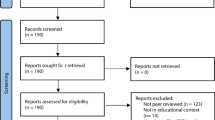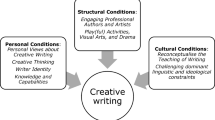Abstract
In this article, we demonstrate how I poems, part of the Listening Guide method, can help researchers to better understand the multiple voices that might comprise a student’s mathematical identity. We provide an analysis of one student’s interview as an example of this method. We argue that the use of the Listening Guide method illuminates the complexity of students’ mathematical identities, especially their fluid, negotiated, and sometimes contested character. In the example shared here, we show how others’ discourses become part of a student’s developing mathematical identity, as well as highlight how the addition of drawings enhances the Listening Guide method.




Similar content being viewed by others
Notes
A Wordle is a visual representation of word frequencies.
References
Andersson, A., Valero, P., & Meaney, T. (2015). “I am [not always] a maths hater”: Shifting students’ identity narratives in context. Educational Studies in Mathematics, 90(2), 143–161. https://doi.org/10.1007/s10649-015-9617-z
Bakhtin, M. M. (1981). The dialogic imagination: Four essays by M. M. Bakhtin (C. Emerson & M. Holquist, Trans.). Austin, TX: University of Texas Press.
Balan, B. N. (2005). Multiple voices and methods: Listening to women who are in workplace transition. International Journal of Qualitative Methods, 4(4), 63–86 Retrieved from http://ejournals.library.ualberta.ca/index.php/IJQM/
Bartholomew, H., Darragh, L., Ell, F., & Saunders, J. (2011). ‘I’m a natural and I do it for love!’: Exploring students’ accounts of studying mathematics. International Journal of Mathematical Education in Science and Technology, 42(7), 915–924. https://doi.org/10.1080/0020739X.2011.608863
Baumeister, R. F. (1997). Identity, self-concept, and self-esteem: The self lost and found. In R. Hogan, J. Johnson, & S. Briggs (Eds.), Handbook of personality psychology (pp. 681–710). New York: Academic Press.
Beauchamp, C., & Thomas, L. (2009). Understanding teacher identity: An overview of issues in the literature and implications for teacher education. Cambridge Journal of Education, 39(2), 175–189. https://doi.org/10.1080/03057640902902252
Bishop, J. P. (2012). “She’s always been the smart one. I’ve always been the dumb one”: Identities in the mathematics classroom. Journal for Research in Mathematics Education, 43(1), 34–74. Retrieved from http://www.nctm.org/publications/journal-for-research-in-mathematics-education/
Boaler, J. (2002). Exploring the nature of mathematical activity: Using theory, research and ‘working hypotheses’ to broaden conceptions of mathematics knowing. Educational Studies in Mathematics, 51(1/2), 3–21. https://doi.org/10.1023/A:1022468022549
Boaler, J. (2008). What’s math got to do with it? Helping children learn to love their least favorite subject—And why it’s important for America. New York: Viking.
Brown, L. M., Argyris, D., Attanucci, J., Bardige, B., Gilligan, C., Johnston, D. K., … Wilcox, D. (1988). A guide to reading narratives of conflict and choice for self and relational voices (monograph no. 1). Cambridge: Harvard Graduate School of Education, Project on the Psychology of Women and the Development of Girls.
Brown, L. M., & Gilligan, C. (1992). Meeting at the crossroads: Women’s psychology and girls’ development. Cambridge: Harvard University Press.
Brown, M., Brown, P., & Bibby, T. (2008). ‘I would rather die’: Reasons given by 16 year-olds for not continuing their study of mathematics. Research in Mathematics Education, 10(1), 3–18 Retrieved from http://www.tandfonline.com/toc/rrme20/current
Brown, T., & McNamara, O. (2011). Becoming a mathematics teacher: Identity and identifications. Dordrecht: Springer.
Butler, J. (1990). Gender trouble: Feminism and the subversion of identity. New York: Routledge.
Cobb, P., Gresalfi, M., & Hodge, L. L. (2009). An interpretive scheme for analyzing the identities that students develop in mathematics classrooms. Journal for Research in Mathematics Education, 40(1), 40–68 Retrieved from http://www.nctm.org/publications/journal-for-research-in-mathematics-education/
Darragh, L. (2015). Recognising ‘good at mathematics’: Using a performative lens for identity. Mathematics Education Research Journal, 27(1), 83–102. https://doi.org/10.1007/s13394-014-0120-0
Davis, B. (1995). Thinking otherwise and hearing differently: Enactivism and school mathematics. Journal of Curriculum Theorizing, 11(4), 31–56.
Doucet, A., & Mauthner, N. S. (2008). What can be known and how? Narrated subjects and the listening guide. Qualitative Research, 8(3), 399–409 Retrieved from http://qrj.sagepub.com/
Edwards, R., & Weller, S. (2012). Shifting analytic ontology: Using I-poems in qualitative longitudinal research. Qualitative Research, 12(2), 202–217 Retrieved from http://qrj.sagepub.com/
Forrest, J., Nikodemos, L., & Gilligan, C. (2016). The experience of receiving scholarship aid and its effect on future giving: A listening guide analysis. Qualitative Research in Psychology, 13(1), 47–66. https://doi.org/10.1080/14780887.2015.1106628
Forster, P. A. (2000). Katie thought she couldn’t do it but now knows she can. Educational Studies in Mathematics, 43(3), 225–242. https://doi.org/10.1023/A:1011903213430
Gee, J. P. (2000). Identity as an analytic lens for research in education. Review of Research in Education, 25, 99–125. https://doi.org/10.2307/1167322
Gilligan, C. (1982). In a different voice: Psychological theory and women’s development. Cambridge: Harvard University Press.
Gilligan, C. (2015). The listening guide method of psychological inquiry. Qualitative Psychology, 2(1), 69–77. https://doi.org/10.1037/qup0000023
Gilligan, C., Spencer, R., Weinberg, M. K., & Bertsch, T. (2003). On the listening guide: A voice-centered relational method. In P. M. Camic, J. E. Rhodes, & L. Yardley (Eds.), Qualitative research in psychology: Expanding perspectives in methodology and design (pp. 157–172). Washington, DC: American Psychological Association.
Graziano, M. (2014). Narratives in higher education: Dominican American women and meaning making during and post college. Paper presented at the 31st annual qualitative analysis conference. London, Canada.
Hall, J. (2012). Gender issues in mathematics: An Ontario perspective. Journal of Teaching and Learning, 8(1), 59–72 Retrieved from https://ojs.uwindsor.ca/ojs/leddy/index.php/JTL
Hall, J., Towers, J., Takeuchi, M., & Martin, L. C. (2015). Investigating students’ positive relationships with mathematics. In K. Beswick, T. Muir, & J. Wells (Eds.), Proceedings of the 39th annual meeting of the International Group for the Psychology of Mathematics Education (Vol. 1, p. 164). Hobart, Australia: PME.
Hall, S. (1996). Introduction: Who needs identity? In S. Hall & P. du Gay (Eds.), Questions of cultural identity (pp. 1–17). London: SAGE.
Henkel, M. (2005). Academic identity and autonomy revisited. In I. Bleiklie & M. Henkel (Eds.), Governing knowledge: A study of continuity and change in higher education (pp. 145–165). Dordrecht: Springer.
Horn, I. S. (2008). Turnaround students in high school mathematics: Constructing identities of competence through mathematical worlds. Mathematical Thinking and Learning, 10(3), 201–239. https://doi.org/10.1080/10986060802216177
Kaasila, R. (2007). Mathematical biography and key rhetoric. Educational Studies in Mathematics, 66(3), 373–384. https://doi.org/10.1007/s10649-007-9085-1
Kiegelmann, M. (2000). Qualitative-psychological research using the voice-approach. Forum Qualitative Sozialforschung / Forum: Qualitative Social Research, 1(2), 1–8 Retrieved from http://www.qualitative-research.net/index.php/fqs
Knighton, T., Brochu, P., & Gluszynski, T. (2010). Measuring up: Canadian results of the OECD PISA study. Ottawa: Minister of Industry.
Lim, J. H. (2008). Adolescent girls’ construction of moral discourses and appropriation of primary identity in a mathematics classroom. ZDM, 40(4), 617–631. https://doi.org/10.1007/978-3-642-27702-3_6
Lutovac, S., & Kaasila, R. (2014). Pre-service teachers’ future-oriented mathematical identity work. Educational Studies in Mathematics, 85(1), 129–142. Retrieved from http://link.springer.com/journal/10649
Markus, H., & Wurf, E. (1987). The dynamic self-concept: A social psychological perspective. Annual Review of Psychology, 38(1), 299–337. https://doi.org/10.1146/annurev.ps.38.020187.001503
Maturana, H. R., & Varela, F. J. (1992). The tree of knowledge: The biological roots of human understanding. Boston: Shambhala.
McClain, O. L. (2014). Negotiating identity: A look at the educational experiences of black undergraduates in STEM disciplines. Peabody Journal of Education, 89(3), 380–392. https://doi.org/10.1080/0161956X.2014.913451
Oyserman, D. (2001). Self-concept and identity. In A. Tesser & N. Schwarz (Eds.), The Blackwell handbook of social psychology (pp. 499–517). Malden: Blackwell.
Oyserman, D., Elmore, K., & Smith, G. (2012). Self, self-concept, and identity. In M. R. Leary & J. P. Tangey (Eds.), Handbook of self and identity (2nd ed., pp. 69–104). New York: The Guilford Press.
Plosz, J., Towers, J., & Takeuchi, M. (2015). Students’ images of mathematics explored through drawings. In T. G. Bartell, K. N. Bieda, R. T. Putnam, K. Bradfield, & H. Dominguez (Eds.), Proceedings of the 37th annual meeting of the North American Chapter of the International Group for the Psychology of Mathematics Education (p. 590). East Lansing, MI: Michigan State University.
Rudrauf, D., Lutz, A., Cosmelli, D., Lachaux, J.-P., & Le Van Quyen, M. (2003). From autopoiesis to neurophenomenology: Francisco Varela’s exploration of the biophysics of being. Biological Research, 36(1), 27–65. https://doi.org/10.4067/S0716-97602003000100005
Schütze, F. (2009). Biography analysis on the empirical base of autobiographical narratives: How to analyse autobiographical narrative interviews—Part one. European Studies on Inequalities and Social Cohesion, 1, 153–242 Retrieved from http://www.profit.uni.lodz.pl/pub/dok/6ca34cbaf07ece58cbd1b4f24371c8c8/European_Studies_2008_vol_1.pdf
Sfard, A., & Prusak, A. (2005). Telling identities: In search of an analytic tool for investigating learning as a culturally shaped activity. Educational Researcher, 34(4), 14–22. https://doi.org/10.3102/0013189X034004014
Simpson, A. (2015). Kaleidoscopic view of voices shaping female and male adolescents’ dynamic mathematics identity within single-sex and coeducational environments (Unpublished doctoral dissertation). Clemson University, Clemson, SC.
Simpson, A., & Che, S. M. (2015). Use of I-poems to uncover adolescents’ dynamic mathematics identity within single-sex and coeducational classes. In K. Beswick, T. Muir, & J. Wells (Eds.), Proceedings of the 39th psychology of mathematics education conference (Vol. 4, pp. 177–184). Hobart, Australia: PME.
Sridharan, V. (2015). Beyond consensual domains: Enactivism, social representations and third-order unities. Culture and Psychology, 21(2), 259–275. https://doi.org/10.1177/1354067X15570489
Swann, W. B., Jr. (1987). Identity negotiation: Where two roads meet. Journal of Personality and Social Psychology, 53(6), 1038–1051. https://doi.org/10.1037/0022-3514.53.6.1038
Taylor, C. (1994). The politics of recognition. In C. Taylor, K. A. Appiah, J. Habermas, S. C. Rockefeller, M. Waltzer, & S. Wolf (Eds.), Multiculturalism: Examining the politics of recognition (pp. 25–73). Princeton: Princeton University Press.
Towers, J., Hall, J., & Martin, L. (2015). Students’ images of mathematics. In S. Oesterle & D. Allan (Eds.), Proceedings of the 2014 annual meeting of the Canadian Mathematics Education Study Group/Groupe Canadien d’Étude en Didactique des Mathématiques (p. 285). Burnaby, Canada: CMESG/CGEDM.
Towers, J., Takeuchi, M., Hall, J., & Martin, L. C. (2015). Exploring the culture of school mathematics through students’ images of mathematics. In T. G. Bartell, K. N. Bieda, R. T. Putnam, K. Bradfield, & H. Dominguez (Eds.), Proceedings of the 37th annual meeting of the North American Chapter of the International Group for the Psychology of Mathematics Education (pp. 570–573). East Lansing, MI: Michigan State University.
Towers, J., Takeuchi, M., Hall, J., & Martin, L. C. (2017). Students’ emotional experiences learning mathematics in Canadian schools. In U. Xolocotzin Eligio (Ed.), Understanding emotions in mathematical thinking and learning (pp. 163–186). London: Elsevier Academic Press.
Urzua, A., & Vasquez, C. (2008). Reflection and professional identity in teachers’ future-oriented discourse. Teaching and Teacher Education, 24(7), 1935–1946 Retrieved from http://www.journals.elsevier.com/teachingand-teacher-education/
Walshaw, M. (2013). Post-structuralism and ethical practice action: Issues of identity and power. Journal for Research in Mathematics Education, 44(1), 100–118 Retrieved from http://www.nctm.org/publications/journalfor-research-in-mathematics-education
Watson, C. (2006). Narratives of practice and the construction of identity in teaching. Teachers and Teaching: Theory and Practice, 12(5), 509–526. https://doi.org/10.1080/13540600600832213
Wood, M. (2013). Mathematical micro-identities: Moment-to-moment positioning and learning in a fourth-grade classroom. Journal for Research in Mathematics Education, 44(5), 775–808 Retrieved from http://www.nctm.org/publications/journal-for-research-in-mathematics-education/
Zambo, R., & Zambo, D. (2013). Using I poems to hear the voices and understand the actions of EdD students conducting action research. The Qualitative Report, 18(84), 1–17 Retrieved from http://www.nova.edu/ssss/QR/
Acknowledgments
We gratefully acknowledge the support of the Social Sciences and Humanities Research Council of Canada, Grant no. 435-2012-0121. The Social Sciences and Humanities Research Council of Canada exercised no oversight in the design of the research; the collection, analysis, and interpretation of data; or the writing of this report.
Funding
Support is from the Social Sciences and Humanities Research Council of Canada, Grant no. 435-2012-0121.
Author information
Authors and Affiliations
Corresponding author
Rights and permissions
About this article
Cite this article
Hall, J., Towers, J. & Martin, L.C. Using I poems to illuminate the complexity of students’ mathematical identities. Educ Stud Math 99, 181–196 (2018). https://doi.org/10.1007/s10649-018-9839-y
Published:
Issue Date:
DOI: https://doi.org/10.1007/s10649-018-9839-y




